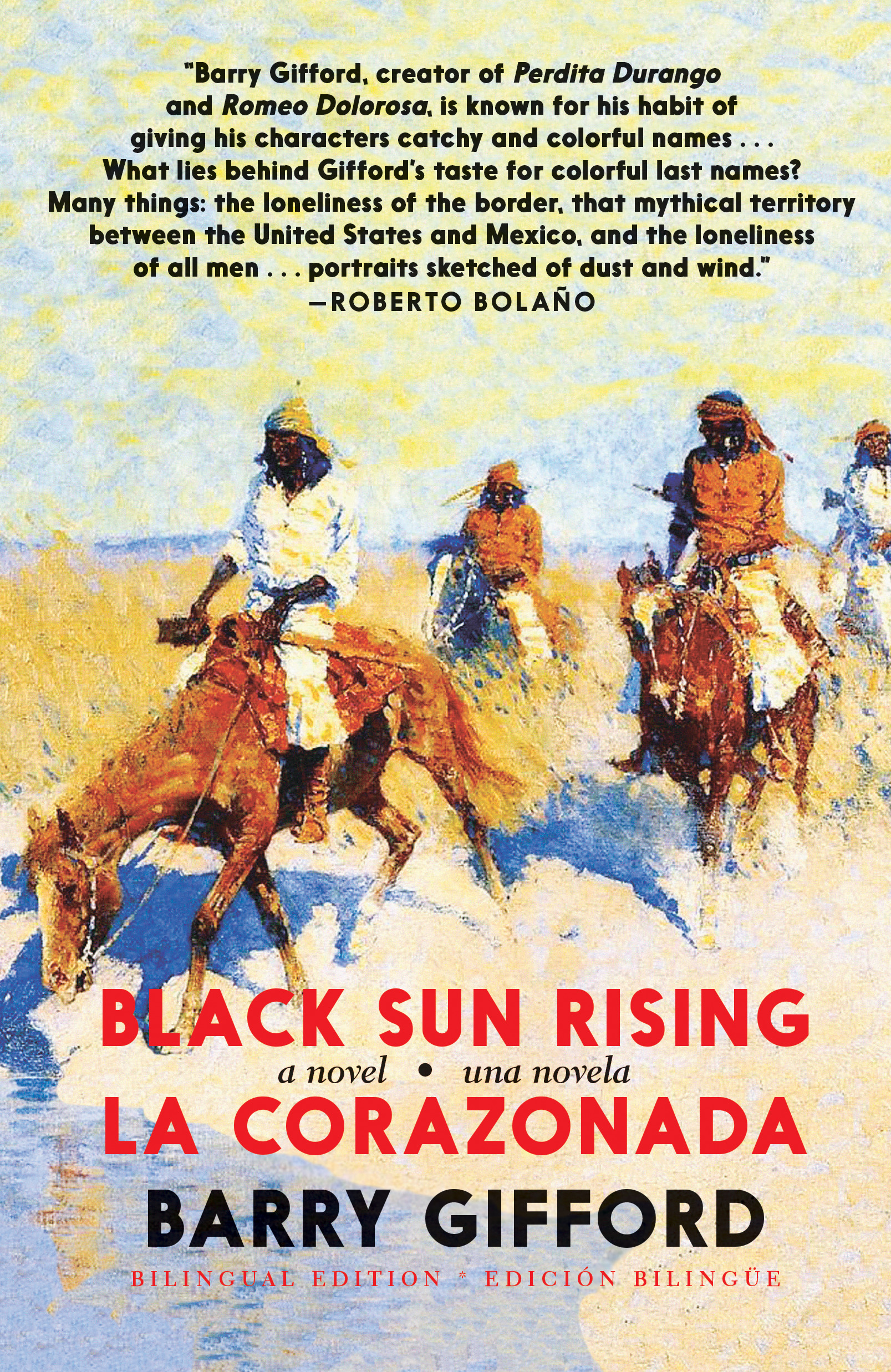The Border Where Noir and Western Meet | Barry Gifford’s Black Sun Rising / La Corazonada
Reviews
By Gabino Iglesias
Barry Gifford’s work has always been cinematic and has been turned into films in the past. However, Black Sun Rising / La Corazonada is the only novel he has written with the idea that it could be made into a film. As a result, the narrative is made up of short chapters, and the descriptions are simultaneously brief and rich. A noir Western full of heart that explores a unique time in American history, Black Sun Rising / La Corazonada is a book that goes above and beyond an action narrative with historical elements: this is a bilingual book that celebrates diversity while showing Gifford is a master storyteller regardless of the genre or story he decides to tackle.
Black Sun Rising / La Corazonada is based on historical events of 1851 and seamlessly merges two stories. The overarching narrative traces the struggles of the Mascogos (or Black Seminoles), the first integrated Native American tribe to establish itself on the North American continent. The Mascogos’ search for freedom and a land to call their own is often overlooked in history books and fiction alike. Gifford changes that by following the Seminoles after they escape relocation camps in Oklahoma and join forces with fugitive slaves. The Seminoles wish to establish themselves in Nacimiento, Mexico, where their leader, Coyote, thinks they are destined to be. Before the Seminoles get there, the Mexican government allows them to stay in Mexico near the Texas-Mexico border as long as they help keep the Comanches and Apaches at bay. In the midst of this chaos, a love story blossoms between Teresa, the daughter of a former slave hunter and Texas Ranger, and Sunny, a son of the legendary Seminole chief Osceola. The romance doesn’t go over well with Teresa’s father. What follows is a violent, poetic, fast-paced tale that shines a light on a largely unknown chapter of not only American history but also Mexican history.
In terms of diversity, no contemporary Western comes close to what Black Sun Rising / La Corazonada accomplishes. There are Mascogos, Mexicans, White cowboys, Mescalero Apaches, and African Americans here, and Gifford makes sure that every group receives proper representation and historical contextualization. From racists to former slaves, this novel digs deep into the maelstrom of people, languages, and cultures that was the US-Mexico border in the 1850s. Also, Gifford’s research shines throughout the story:
A makeshift tribe of Seminole Indians, originally mostly Southern Creeks from Georgia and Florida, and fugitive slaves, known as Mascogos, collectively numbering about four-hundred, had established a camp at the mouth of a rugged, mesquite-filled canyon called El Moral. These were remnants of the people who had survived the long Seminole Wars and re-location from Florida to Oklahoma, and runaways from the Confederate states. The groups had banded together in Mexico in an attempt to live as free men and women.
Gifford is a master of noir. His prose has always been fast and punchy, but here, these qualities are even more vividly evident because he keeps the episodic and visual nature of film in mind while writing. Here’s an entire chapter as an example:
Dupuy’s army of over a hundred men rode along in a column of twos, headed for Mexico. This formidable bunch consisted of Dupuy’s “society”—mercenaries, professional slavehunters, irregular Texas Rangers and adventurers. A grim-faced Dupuy led the way. Royce Box rode alongside him. Out-fitted by Dupuy, all of the men had long-handled Çolt .45’s strapped to their legs and Winchester rifles tucked behind their saddles.
Black Sun Rising / La Corazonada is a story about friendship and violence that also explores forbidden love, a series of historical events, and a unique group of people, often overlooked, who embody the changing, hybrid quality of the US-Mexico borderlands but also of American identity in general. Gifford is a gifted storyteller, and his powers are on full display here. Sharp dialogue, short chapters that accomplish a lot, and solid character development add up to a narrative that’s wildly entertaining and engaging.
Reading a book and then immediately reading it again is a strange thing, especially if the book is in a different language. This novel contains Black Sun Rising and then its translation into Spanish by Laura Emilia Pacheco, La Corazonada. The narratives are identical, and the story doesn’t lose anything in the translation. Also, there is a bit of Spanish sprinkled into the English version. While the Spanish in Black Sun Rising is solid, a few missing accents and other small errors give the impression that it wasn’t edited by a native speaker. On the other hand, the Spanish in La Corazonada is clean, accurate, and easy to read.
As with anything by Gifford, this book is worth a read because it takes adventure and violence and wraps them around characters that feel real, so empathy is almost immediate. The breakneck speed of the narrative and the rich historical details are just icing on the cake. Furthermore, making this a bilingual edition was a great idea that hopefully will bring Gifford to new readers both here and in Mexico, where the book was published by Editorial Almadía. While all the directors Gifford had in mind when he started writing the novel were either dead or retired by the time he had finished it, Black Sun Rising / La Corazonada could easily translate to the big screen, and I hope someone makes it happen. In the meantime, go read it. Gifford is one of the best storytellers of our time.
Gabino Iglesias is a writer, professor, and book reviewer living in Austin, Texas. He is the author of Zero Saints and Coyote Songs and the editor of Both Sides: Stories from the Border. You can find him on Twitter @Gabino_Iglesias.
More Reviews



